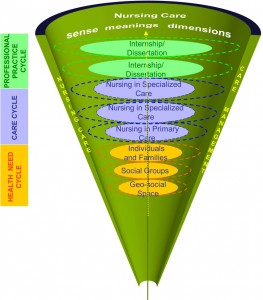With the purpose of training generalist nurses, the EEUSP BS in Nursing is a fulltime, 4-year course with a total workload of 4,170hrs and 37 compulsory subjects distributed into 8 semesters.
The course is guided by the following principles:
• Undergraduate studies as the early step for a nurse’s training;
• Acknowledging work as the training-process definer;
• Practice as the locus for generating learning questions;
• Articulation between theory and practice on developing nursing education;
• Including students into practice scenarios from the very first semester of the course;
• Training for SUS (Single Health System) as a curriculum general orientation;
• Acknowledging the social role of the public university;
• Research as a tool for the pedagogic process and the nurse’s work;
• Student’s apprenticeship and professional work organized according to scientific reasoning;
• Student as the subject of the early training process and as active participation in the curriculum;
• Student’s autonomy;
• Inseparability between training, research, and extension.
Every year 80 students are selected through FUVEST (University Foundation for Entrance Exams). Classes are given at the School of Nursing itself within partner-units of the Quadrangle Healthcare/Rights (Faculty of Medical Sciences and Faculty of Public Health) and the units of Butantã Campus (Faculty of Humanities, Faculty of Education, Institute of Chemistry, Institute of Biomedical Sciences, Institute of Biosciences, and Institute of Psychology). Apart from the BS, students can choose to take Degree as from the 5th semester, attending to specific subjects at EEUSP and Faculty of Education of USP. In this case, the course will be completed within nine school semesters.
The BS in Nursing is an inter-departmental course, since the Modules that compose the curricular structure are offered in an articulated shape by the four EEUSP departments.
The Central Axis of the curriculum is Nursing Care in its different senses, meanings, and dimensions. The curriculum structure is organized into three Cycles:
• Cycles of Needs – with 1,530hrs;
• Cycle of Care – with 1,710hrs;
• Cycle of Professional Practice – with 930hrs, including the 120hrs for the End-of-Course Paper.
Each Cycle is articulated around the integrating axes, organized in semesters composed of Modules with strong emphasis upon the theory-practice relation, allowing the students to bigger knowledge integration by means of inserting their practical activities under professorial tutorship. Moreover, through elaborating action projects applied to healthcare reality under analysis, it is intended to make the students achieve their autonomy development. For such, the focus lies on strategies that lead to the students’ full development concerning their cognitive, affective, and psychomotor capacities with a view to significant and continuous learning, articulated towards their project of life and training.
Figure: Curricular structure representational scheme – EEUSP BS in Nursing.
Curricular structure of the EEUSP BS in Nursing
Degree in Nursing
Its objective is to train professors to perform in High School and Vocational Training in Nursing.
The practical activities of the courses are developed in public and private health and education institutions. The supervised curriculum training, a transition from the academic life into the working world, is the last stage of the courses and can be performed during the 8th semester, for the Bachelor degree. Those who seek the Licentiate, in addition to their Bachelor degree studies, must attend specific education disciplines from the 3rd year on and develop the supervised training period in professional education institutions during the 9th semester. As a part of the education process, students perform scientific initiation under the orientation of a doctorate professor. Many projects have the support of agencies that promote research through scholarships for undergraduate research.
Pedagogic Project
Bachelor of Science (BS)
The political-pedagogical proposal of the course privileges the critical and reflexive training of the nurse, being able to:
• Recognize the human nature in different expressions and evolving phases;
• Recognize the structures and shapes of social organization;
• Understand the social policies, in particular the healthcare policies, and their interface with nursing practicing;
• Intervene in nursing making use of clinic reasoning and scientific evidences towards practicing, according to the individual’s specificities and the epidemiological profiles of the community, and complying with the ethical and legal principles of the profession;
• Seek and use new knowledge to develop professional practicing;
Field Teaching Activities
The EEUSP Undergraduate Studies is privileged due to the different scenarios in which theoretical-practical activities and curricular and extra-curricular traineeships are carried out. The integrality view and the progressive caring within the service network of SUS (Single Health System) have been deepened with the new curriculum, which has fostered the practical activities in specialized and at-home, primary healthcare units.
The practicing fields are chosen considering their learning potential for the students. Services with performing professional nurses, and whose work is structured, are chosen.
End-of-Course Project/Work/Paper
The TCC (End-of-Course Work) is a basic requirement of all students to achieve full training, developed continually as from the 5th semester of the course till its completion.


